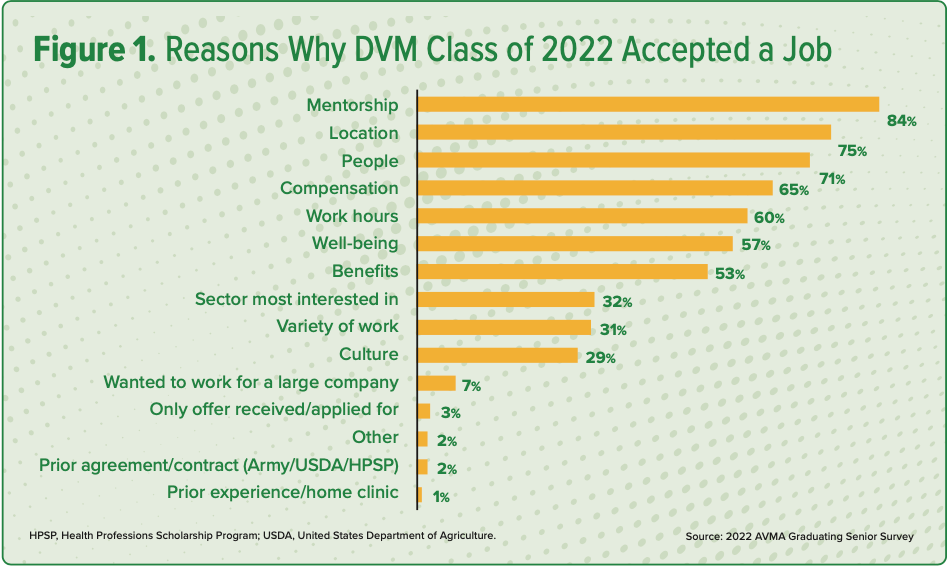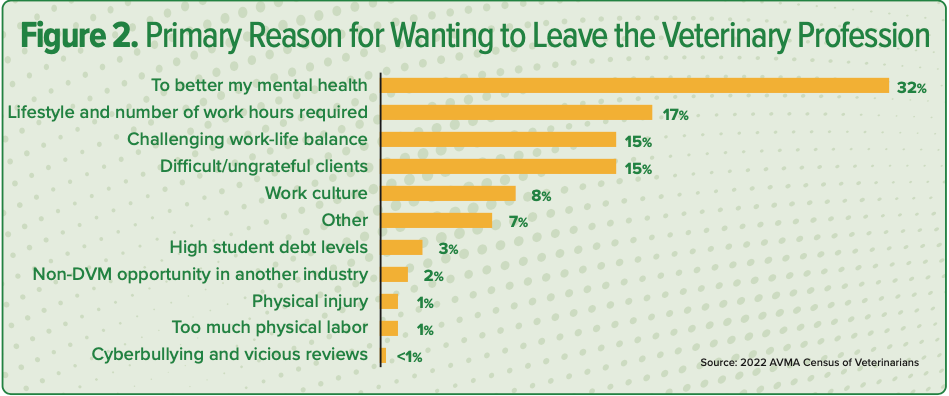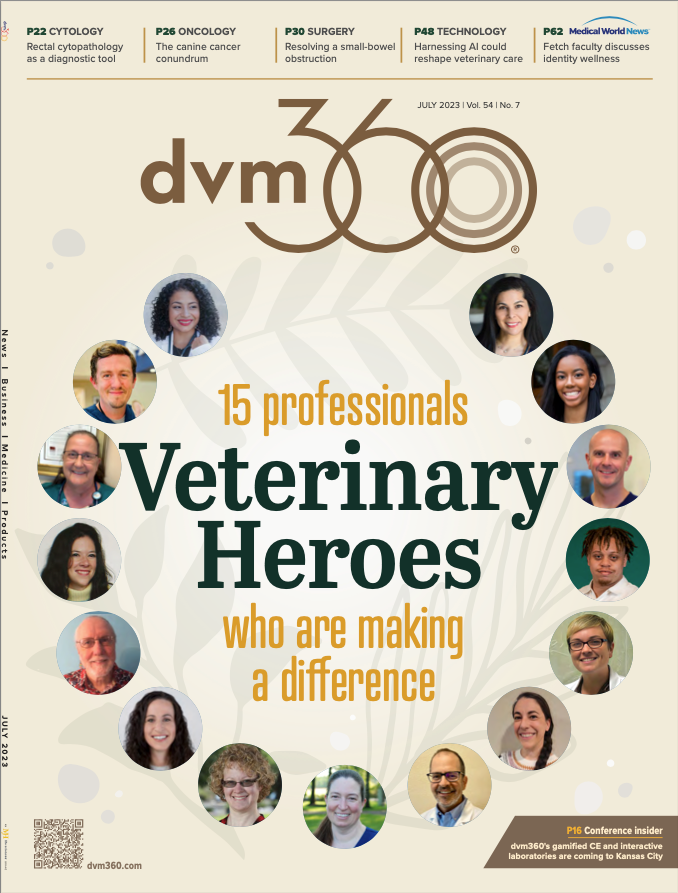How to attract and keep staff in a job seeker’s market
Some tips on how you can recruit and retain talented professionals
Since the pandemic began, many practices have been seeking an edge in hiring and retaining veterinarians. For many employers, the current tight labor market means more competition for candidates, while economic uncertainty and high inflation put pressure on their bottom lines. Beyond offering high salaries and good benefits, what can they do to recruit and retain talented professionals? Recent data from the American Veterinary Medical Association (AVMA) offer some clues.
Mentorship
In our survey of graduating veterinary students in 2022, 84% cited mentorship as motivating factor behind their decision to accept a job—more than location, compensation, and benefits (Figure 1).
Mentorship is also key to retention, particularly among those who are beginning their careers. For instance, a Canadian survey of early-career veterinarians found that inadequate mentorship and support was one of the main reasons for their decision to switch jobs.1

Whether provided by someone inside or outside the clinic (or both), mentorship by experienced, nurturing colleagues can set veterinarians up for professional success and satisfaction. This, in turn, may lead to better patient outcomes, greater productivity, a superior work culture, and a more robust profession overall. Plus, the relationship can be rewarding for both mentor and mentee and contribute to their sense of fulfillment.
New mentorship program
Of course, not every practice can provide formal mentoring to new hires, and sometimes it’s good to be able to turn to someone outside the practice for support and advice. A new program offered through the AVMA fills this need.
We have partnered with MentorVet to offer free RACE-approved mentoring to all 2023 graduates who are AVMA members. MentorVet Connect pairs new veterinarians with mentors outside their place of work based on common interests. If your practice is hiring new graduates, you’ll want to encourage them to sign up for this program, and—no matter what your hiring status—consider becoming a mentor yourself. For details and infor- mation on how to enroll, visit avma.org/Mentor.
People/work culture
Other factors that determined job choices among Class of 2022 graduates were the people and the culture at the practice they agreed to join. According to the American Animal Hospital Association, a key component of workplace satisfaction is having a healthy relationship with one’s colleagues.2
Workplace culture has also been shown to affect retention. Indeed, in the 2022 AVMA Census of Veterinarians, work culture was among the top 5 reasons why surveyed veterinarians not yet ready to retire were considering switching to another profession3 (Figure 2). Another reason mentioned in a 2019 survey conducted by the Institute of Education Sciences was not feeling valued/not being rewarded in nonfinancial ways.4

So how can you build a great team and an environment that is both inviting and emotionally sustaining for existing staff? A comprehensive onboarding program is a good place to start. You can find a wealth of resources at avma.org/TeamCPR.
The AVMA also offers a wide range of tools to build supportive workplaces. For example:
- The Journey for Teams program (JourneyForTeams.org), which consists of 15-minute modules on building more diverse, equitable, and inclusive workplaces, is available free of charge to the entire profession.
- The Workplace Wellbeing Certificate Program on AVMA Axon (avma. org/Axon) teaches all team members how to foster welfare in the workplace.
- The Brave Space Certificate Program (avma.org/BraveSpace) empowers veterinary team members to turn the practice into a place where individual differences are recognized and valued.
These resources can also support another factor—personal well-being—that is important to job seekers and seasoned team members alike.
Personal well-being and work-life balance
Well-being can be influenced by many factors, and in turn influence workplace culture. Well-being is part of work-life balance, and both are crucial to attracting and retaining staff. More than half the Class of 2022 cited work hours as a reason for accepting a job, and nearly as many cited well-being.
Although it is great that so many new veterinarians are prioritizing self-care, as a profession we still have a great deal to do when it comes to personal wellness. In 2022, the No. 1 reason veterinarians considered leaving the profession (other than retirement) was to improve their mental health.3 The second and third reasons were the number of hours they had to work and the challenge of juggling their employment with their personal life.
Improving well-being and supporting work-life balance are responsibilities that demand a commitment from all of us. We have access to many resources for managing or preventing burnout and other threats to well-being, including those that can be found at avma.org/Wellbeing.
How we manage and operate veterinary practices can also affect well-being and work-life balance. Below are suggestions for fighting burnout and reducing the pressure on team members.5,6
- Improve workflow by delegating appropriate tasks to credentialed veterinary technicians.
- Reduce time pressure by extending patient visits by 5 minutes.
- Solicit and address staff concerns.
- Limit the number of hours staff work.
- Teach, recognize, and support self-care for staff.
- Improve staff communications with regular meetings.
Strengthening client relations
Difficult interactions with clients, especially unhappy ones, can also take an emotional toll on us and disrupt our workday. The AVMA provides a range of resources to improve relationships with clients.
- The Positive Pet Care Guide (avma.org/PositivePartners) helps practices set and manage client expectations. Developed in response to the concerns of veterinary professionals and pet owners, this single-page guide outlines how to match everyone’s expectations. Use it to foster healthy lines of communication and a positive partnership between clients and staff.
- The Language of Veterinary Care Initiative (avma.org/ LanguageOfCare) teaches words and phrases that can foster trust in clients and improve care for patients.
- The reputation management toolkit (avma.org/Reputation) helps you build your social media presence, combat cyberbullies, and protect your reputation.
Key takeaways
Although compensation and benefits are certainly important, AVMA data show that mentorship, work culture, personal well-being, and work-life balance are critical to attracting and retaining staff. These factors are interconnected, and success or struggles in one can spill over into the others. Investing in these areas will facilitate recruitment, reduce turnover, and support individual and team health. Our businesses, our patients, our teams, and our profession will all benefit as a result.
References
- Jelinski MD, Campbell JR, MacGregor MW, Watts JM. Factors associated with veterinarians’ career path choices in the early postgraduate period. Can Vet J. 2009;50(9):943-948.
- AAHA’s culture initiative. American Animal Hospital Association. Accessed June 26, 2023. www.aaha.org/ practice-resources/healthy-workplace-culture/
- Bain B, Ouedraogo FB, Hansen C. Wellbeing. In: 2023 AVMA Report on the Economic State of the Veterinary Profession. American Veterinary Medical Association; 2023:31-34.
- Robinson D, Edwards M, Mason B, Cockett J, Arnill Graham K, Martin A. The 2019 survey of the veterinary profession: a report for the Royal College of Veterinary Surgeons. Royal College of Veterinary Surgeons. February 2020. Accessed June 6, 2023. www.rcvs.org.uk/news-and-views/ publications/the-2019-survey-of-the-veterinary-profession/
- AVMA Veterinary Economics Division staff. Increasing efficiency and productivity in uncertain times. DVM360; 2023:54(1):52.
- Ouedraogo FB, Weinstein P, Lefebvre SL. Increased efficiency could lessen the need for more staff in companion animal practice. J Am Vet Med Assoc. Published online May 30, 2023. doi:10.2460/javma.23.03.0163

Newsletter
From exam room tips to practice management insights, get trusted veterinary news delivered straight to your inbox—subscribe to dvm360.